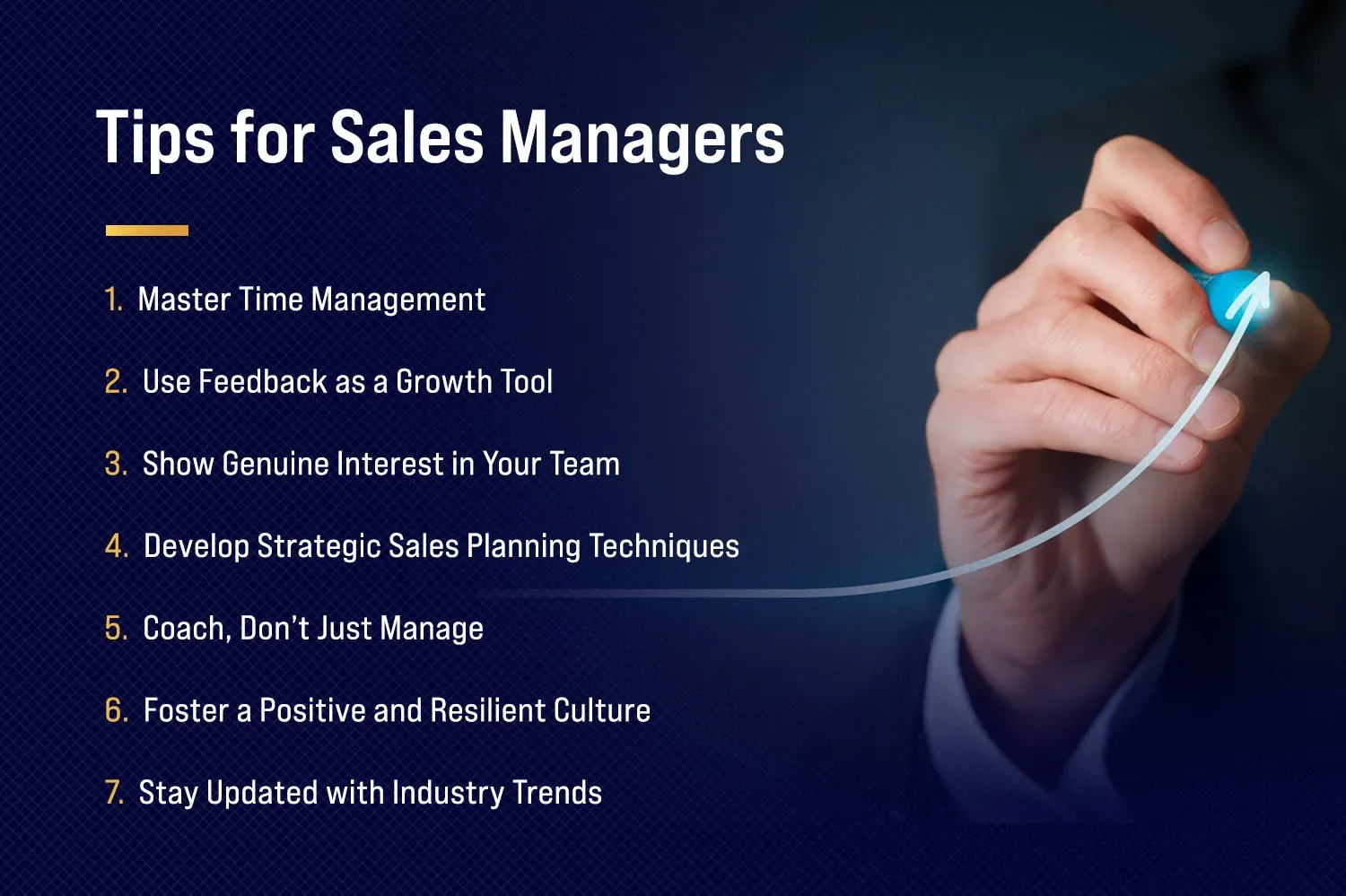How to Become a Sales Manager?

So, you’re thinking about trading in your sales associate badge for the bigger desk, better pay, and broader responsibilities of a sales manager? It’s a natural aspiration, one that unlocks dynamic career opportunities and professional growth. But before you step into the role, it’s worth asking: Are you ready for what it really takes?
Becoming a sales manager is about more than hitting your own quotas. It means leading a team, driving strategy, and developing others. If that sounds like your calling, you’re in the right place.
In this guide, we’ll break down what separates a sales manager from a sales professional, the mindset shift required, and eight practical steps you can take to make the jump. Let’s dive in.
What Does a Sales Manager Do?
A sales manager is responsible for directing a company’s sales activities, guiding a team to meet revenue objectives, and aligning with broader business strategies. Their role involves crafting sales plans, coaching staff, evaluating market insights, and enhancing overall performance. Their responsibilities typically include:
- Hiring, training, and evaluating sales staff.
- Establishing and tracking sales objectives to ensure progress.
- Examining sales metrics to uncover growth potential
- Designing and executing effective sales approaches.
- Managing customer input and addressing their concerns.
- Coordinating with marketing and product teams.
- Encouraging the sales team to surpass performance benchmarks.
It does not matter if the sales manager is working in a B2B (business-to-business) or B2C (business-to-consumer) sectors, they must blend strategic thinking with people skills to achieve long-term success.
How to Become a Sales Manager?
Climbing the ladder to sales management is a journey that requires a combination of education, practical experience, and personal development. Here's a step-by-step look at how to make that journey.

Obtain a Bachelor's Degree
Most employers prefer sales managers with at least a bachelor’s degree. According to industry data, 63% of sales managers hold a bachelor's degree, with common fields of study including:
- Business Administration
- Marketing
- Communications
- Commerce
- management
A degree program provides foundational knowledge in consumer behavior, analytics, leadership, and market dynamics—skills that are directly applicable to a sales leadership role.
Gain Relevant Sales Experience
To effectively lead a sales team, you need firsthand experience working in sales environments. This typically involves several years in sales-focused roles, such as:
- Sales Representative
- Account Executive
- Customer Success Associate
- Inside/Outside Sales Representative
- Telemarketer
Use the time you spend working in some of these above-mentioned roles to master prospecting, client communication, closing techniques, and CRM systems. High performance in these roles builds your credibility and gives you the opportunity to lead projects or mentor new hires, which are early signs of sales leadership.
Hone Key Sales and Leadership Skills
Sales management requires a diverse blend of technical and interpersonal abilities. Here’s what to focus on:
Technical Sales Skills
- Proficiency in CRM platforms (e.g., Salesforce, HubSpot)
- Data analysis and performance tracking
- Pipeline and sales forecasting
- Creating and executing sales plans
- Product knowledge and solution selling
Workplace Skills
- Effective verbal and written communication
- Team leadership and mentoring
- Organizational and multitasking abilities
- Active listening and empathy
- Customer relationship building
Personal Attributes
- High resilience and adaptability
- Motivation and goal orientation
- Comfort with change and fast-paced environments
- Problem-solving mindset
Courses like Microsoft Copilot for Sales can further help you sharpen skills in AI-powered sales tools, forecasting, and customer data analysis—increasing your efficiency and tech readiness.
Consider Earning a Master’s Degree (Optional)
Though not an absolute requirement, a Master of Business Administration (MBA) or a specialized degree in sales leadership can be a highly valuable differentiator for students, especially for those aspiring to executive roles like VP of sales or director of sales.
This is particularly useful in highly competitive or technical industries, where strategic thinking and data analysis are crucial.
Pursue Professional Certifications
If you don't want to go for a traditional MBA degree, then you can help reinforce your credibility by pursuing relevant professional certification. Continuous skill development sharpens your proficiency and ensures you stay ahead of evolving industry developments. Top sales manager certifications include:
- Certified Sales Manager (CSM) – Institute of Professional Managers
- Certified Sales Leadership Professional (CSLP)
- Certified Inside Sales Professional (CISP) – AA-ISP
- HubSpot Sales Management Courses
- Microsoft Copilot for Sales Training
These credentials enhance your understanding of topics like sales forecasting, CRM optimization, remote team management, and strategic planning.
Average Salary and Job Outlook for a Sales Manager
In India, the role of a sales manager offers both financial reward and career stability. According to Glassdoor, the estimated total annual compensation for this position is approximately ₹17.5 lakhs, with an average base salary of ₹12.5 lakhs. These figures highlight the dynamic earning potential of the role, especially for high performers and those managing large or high-value territories.
A Positive Employment Outlook
From a job market perspective, the demand for skilled sales managers continues to grow steadily across India, creating a favorable hiring climate:
- Retail sector: 9% growth
- Information Technology (IT) services: 7.4% growth
- Insurance: A remarkable 32% growth
- Consumer durables: Over 30% growth
This upward trend indicates that businesses across sectors are recognizing the critical role that sales managers play in driving revenue and customer engagement. With India’s expanding digital skill economy and consumer base, sales management remains a resilient and attractive career path for professionals looking to advance.
Key Skills for a Sales Manager
To thrive in a sales leadership role, professionals must possess a balanced mix of interpersonal, strategic, and analytical skills. Below are the essential competencies every effective sales manager should develop:
- Effective Communication: Strong communication skills are at the core of successful sales leadership. Sales managers must clearly articulate goals, strategies, and expectations to their teams while also listening actively to team members and clients. Strong communication fosters trust, mitigates disputes, and strengthens team cohesion.
- Critical Analysis: Sales managers must assess sales figures, industry shifts, and consumer patterns to drive strategic choices. By analyzing these key performance metrics, they can adjust strategies, forecast future sales, and identify new business opportunities. Data-centric decision-making aligns initiatives with immediate and future business goals.
- Objective Planning: Defining precise, quantifiable, and realistic targets is key to monitoring success and inspiring teams. Sales managers must align their team’s objectives with broader business goals and break them into actionable steps. Clear goals provide focus and help maintain accountability across all sales activities.
- Exceptional Leadership: True leadership goes beyond delegation—it involves motivating others through action. Top sales managers mentor their teams, providing direction, encouragement, and acknowledgment. They excel in boosting productivity, nurturing skills, and fostering a results-driven culture.
- Resilience: Sales is a high-pressure environment, and setbacks are inevitable. Resilient managers maintain their composure during challenging periods and motivate their teams to stay focused. They turn failures into learning opportunities and demonstrate the emotional intelligence needed to sustain team morale.
- Flexibility: In today's fast-changing market landscape, adaptability is essential. Sales managers must quickly pivot strategies in response to industry shifts, economic changes, or internal performance issues. Flexibility allows them to stay competitive and keep their teams agile in the face of uncertainty.
Tips for Sales Managers
The role of a sales manager is both rewarding and demanding, requiring a careful balance of strategic thinking, people management, and results-driven execution. Here are some essential tips to help sales managers lead effectively and deliver consistent results:

Master Time Management
As a sales manager, your day is packed with meetings, performance reviews, sales forecasts, and team support. Ineffective time management can result in lost prospects and exhaustion for both leaders and their teams.
- Concentrate on high-value tasks: Dedicate effort to activities that drive revenue or enhance team capabilities.
- Delegate appropriately: Empower team members to handle administrative or routine responsibilities so you can focus on strategic leadership.
- Set clear daily and weekly goals: Use productivity tools like CRMs, calendars, and task trackers to stay organized and reduce stress.
Use Feedback as a Growth Tool
Constructive feedback is one of the most powerful tools a sales manager can use to develop talent and strengthen performance.
- Give regular feedback: Don’t wait for quarterly reviews—offer real-time insights and encouragement.
- Balance praise with areas of improvement: Acknowledge wins while constructively guiding areas that need development.
- Encourage upward feedback: Let your team know their input is valued. This strengthens leadership and promotes mutual trust.
Show Genuine Interest in Your Team
People perform better when they feel seen, heard, and supported. Great sales managers take time to understand the unique motivations and challenges of each team member.
- Have one-on-one meetings regularly: Use these check-ins to discuss progress, offer support, and get to know your team personally.
- Recognize individual strengths: Tailor responsibilities and development plans to suit each person's skillset.
- Celebrate milestones and wins: Recognition boosts morale and reinforces positive behavior.
Develop Strategic Sales Planning Techniques
A great sales manager doesn’t just react—they proactively lead. This requires having a solid sales strategy that aligns with business objectives and adapts to market conditions.
- Define measurable KPIs and sales targets: Ensure clarity on performance expectations for all team members.
- Implement structured pipelines: Guide your team through each stage of the sales process with consistent methodologies.
- Monitor and evaluate results: Leverage analytics to spot inefficiencies and areas for improvement.
Coach, Don’t Just Manage
Managing is about keeping the machine running; coaching is about making it better. Shift your mindset from oversight to development.
- Offer training sessions: Focus on product knowledge, objection handling, negotiation, and CRM usage.
- Provide mentorship: Be a role model and trusted advisor your team can learn from.
- Tailor your coaching style: Different reps have different learning preferences—adapt accordingly.
Foster a Positive and Resilient Culture
Sales environments can be high-pressure, and morale can dip when targets are missed. Sales managers must set the tone and keep energy levels up.
- Promote collaboration over competition: Encourage sharing of best practices and team wins.
- Promote perseverance: Frame challenges as learning experiences to build resilience.
- Create a safe space for growth: Ensure your team feels comfortable asking for help and taking calculated risks.
Stay Updated with Industry Trends
The sales landscape constantly shifts, with evolving methodologies, client demands, and tools. Staying informed helps you lead with relevance and innovation.
- Attend industry webinars, courses, and events: Keep your skills and insights sharp.
- Experiment with new tools: From AI-powered CRMs to data visualization platforms, explore tech that boosts productivity.
- Adapt to buyer behavior shifts: Whether it's social selling or remote presentations, evolve with the market.
FAQs
Q1. How to become a sales enablement manager?
Ans: To become a sales enablement manager, start by gaining a solid background in sales, digital marketing, or business development—typically through 3–5 years of experience in sales roles. Develop a deep understanding of sales processes, tools (like CRM systems), and training strategies.
A bachelor’s in business, marketing, or a similar discipline is often essential, while certifications in sales training, leadership, or project management can enhance credibility. Proficiency in communication, analysis, and team guidance is crucial. Transition into the role by working closely with sales ops or training teams within your organization.
Q2. How long does it take to become a sales manager?
On average, it takes 3 to 5 years of experience in a sales role to become a Sales Manager. The timeframe for advancement depends on sector, organizational scale, and personal achievements. Most employers look for candidates with proven sales results, leadership potential, and a solid understanding of customer relationship management. Advancing into management may be quicker with a relevant degree, additional certifications, and proactive career development efforts.
Summing Up
Becoming a sales manager is a career-defining step that requires more than just a track record of strong individual performance—it calls for leadership, strategic thinking, and a deep commitment to team success. From building foundational experience in sales roles to acquiring relevant education, certifications, and managerial skills, the journey to sales leadership is both challenging and rewarding.
If you’re passionate about driving results, developing others, and making a broader impact within your organization, stepping into a sales manager role could be the perfect next move. With growing demand across industries and attractive earning potential, now is a great time to pursue this path. Stay focused, keep learning, and lead with purpose—the role of a successful sales manager is as much about empowering others as it is about achieving goals.

